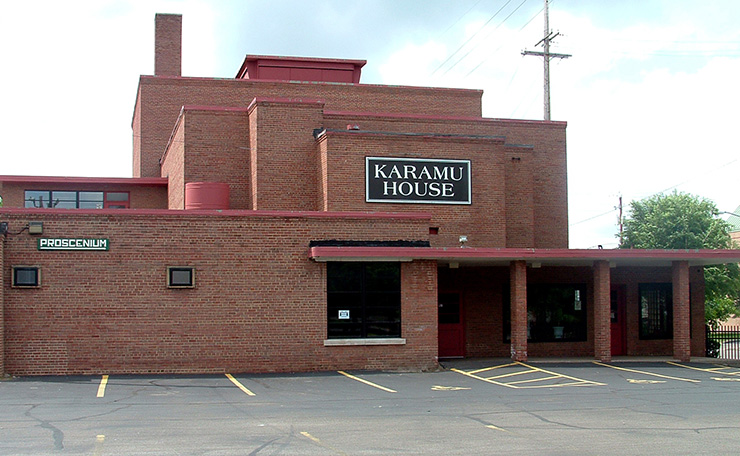
Karamu House
Karamu House
Karamu House are remarkable cultural centers in many ways. In 1915, Russell and Rowena Woodham-Jelliffe set out to establish a common ground where people of different races, religions, social and economic backgrounds could come together to seek and share common ventures.
In 1915, a pair of Oberlin College graduates opened The Playhouse Settlement at the corner of East 38th and Central Avenue. The settlement house idea was conceived out of the principles upon which our nation was founded: that the individual is not wholly determined by his environment but has the capacity to transcend it. Each person can, by his response to his environment, change the way it affects him. The Jelliffe’s soon discovered that the arts provided the perfect common ground.
The early twenties saw a large number of African Americans move into Cleveland from the South. Resisting pressure to exclude their new neighbors, the Jelliffe’s insisted that all races remain welcome. The Playhouse Settlement quickly became a magnet for some of the best Black writers, actors, dancers, printmakers to practice their crafts. The Jelliffe’s held high standards of excellence in the arts, not for the sake of excellence, but because they knew that pursuing excellence makes the greatest demands on the individual to fulfill the promise of his potential.
Playhouse Settlement took its new name in 1941, Karamu House, which better fit the demographics of its Cleveland community. Karamu is a Swahili word meaning “A place of joyful gathering – center of the community.”
Given it was established during the Jim Crow Era of discrimination, the context of Karamu House is best viewed with a wide-angle lens encompassing the past. From the 1910s through the mid-1950s, Hollywood studio executives offered accomplished Black stage actors the roles of inconsequential butler, mammy, farmhand or lazy, ignorant drifter. If the actor asked the director to add a few appropriate speaking lines to bring a tad of dimension and humanity to the character and movie, they were quickly shown the door. Casting offices always had a long line of folks willing to play mute servant or lazy drifter roles.
Similar indignities compelled Paul Robeson to leave Hollywood. After he became of a bankable star singing Old Man River in the play and movie Showboat, Robeson contractually signed to act in more Hollywood movies, only to later discover that scripts concerning his character were changed towards negative stereotypes that catered to a white audience. Rather than wallow in a career of such indignities, like the well-paid Steppin’ Fetchit, Robeson left America for Europe. Only Hattie McDaniel got to play lovable, three-dimensional roles. In movie after movie she was typecast as a lovable, witty mammy. Being well-paid for her lovable typecast roles, she chose to stay in Hollywood rather than retreat to Black theatre. Nothing wrong with that, but she was one of only a handful to achieve that limited status.
Black actors, writers, directors and choreographers found refuge in Black theatres or rare theatres like Karamu that nurtured multicultural-talent. Karamu allowed many to keep working and sharpening their crafts in America until Hollywood and Broadway began opening better roles and plays in the 1950s, 60s and 70s. And though this suggestion is purely hypothetical, one wonders if Cleveland native Dorothy Dandridge, after getting Black-listed by Hollywood, would have had a better outcome by taking advantage of Karamu until better roles opened up in the movies and television. That is what Ruby Dee and Dianne Carroll did.
Famous theatre Karamu alumni include Langston Hughes, Ruby Dee, Ron O’Neal, Robert Guillaume, and James Pickens, Jr. of Grey’s Anatomy. Pickens is also a play producer at Karamu. Alumni often appear at Karamu’s ArenaFest, where orignal works by new playwrights are showcased.
Expanding on its mission to help people fulfill their promise, Karamu House opened an Early Childhood Development Center and developed cultural arts workshops for the community. For more information visit http://www.karamu.com.
